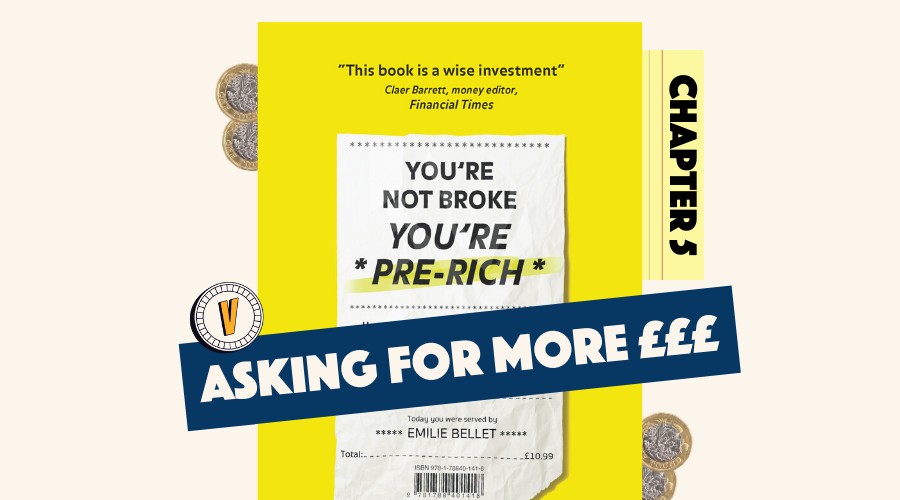Chapter 5 – Asking For More £££
These mini-money guides are based on the practical money book "You're Not Broke You're Pre-Rich" by Emilie Bellet.
It’s time to increase our value and earning power. To do that, we have to stop underestimating our potential.
Unfortunately, most people accept the first salary they are offered, and don’t bother asking for a raise once they’ve got the job. Perhaps you lack confidence or assume you’re already being paid what you’re worth. But how is your boss supposed to realise you’re a rising star if you sit at the back and don’t speak up?
There is another incentive here for women to put their hand up: gender equality. Research shows that women earn on average 18% less than men, and this gap grows to 33% for working mothers.
There is no shame in asking for more money, whether you’re freelance or employed. It’s not about being greedy; it’s about understanding what we’re worth and how much we should and need to be earning. How much do you need to achieve your budget and financial goals, and how much on top of that do you need to live comfortably? Freelancers can work this out too: your rate should cover sick pay, pension contributions, healthcare and other benefits that staffers can often take for granted.
There’s a bit more homework involved before biting the bullet and asking for a raise. For salaried workers, make sure you understand the details on your pay slip - what taxes and deductions you’re paying - and research what other people in your field earn via websites like GlassDoor.com or PayScale.com. If you’re freelance, you can also make the most of your networks and ask your peers what they earn for a specific project or how much they charge as a day rate. There might be no pay slip for freelancers as such, but it’s crucial you learn how you fill in a tax return, how to put aside money for your tax bill and your pension, and consider what kind of structure your freelance business should take i.e. sole trader or a limited company. (An accountant or financial adviser could help you with a lot of that.)
Now, you’re almost ready to enter the negotiation room. There are all sorts of things you can do to prepare for this meeting so you feel more confident: doing the superman/woman pose in the bathroom; writing down a list of your achievements (even better, provide numbers) and finding people who can back you up. Think about how you have earnt the amount you’re asking for and what skills you have that make you irreplaceable.
If you are lucky enough to get an offer, remember you don’t have to accept it straight away. Ask them for a day or two to think it over. And if you’ve already hit the higher salary band, maybe you could negotiate on things like pension contributions, flexible working or holidays instead?
There are no guarantees, no matter how armed with facts and numbers you are. So, if you get shot down, don’t give up. Stating your worth will not injure you - it’s what you deserve. No more, no less. And remember that sometimes the only way we can get what we want is to move jobs, or change clients. This is true in banking, and many other industries.
There are other options besides asking for a raise - like combining freelance work, paid employment and side hustles, whether it’s teaching people how to make bread or selling antiques on eBay. Britons are earning £249 million from passion projects and research shows we are happier even if we just spend 15 minutes a day on doing something we believe in.
“It’s our responsibility to get what we deserve, but that compensation doesn’t just have to come from a pay packet. Money is out there, so let’s go get it!”
JOIN THE COMMUNITY!
Get our weekly newsletter and check our future events here.
If you want to learn more about the book and see a few photos from the book tour, it’s here. You can order "You're Not Broke, You're Pre-Rich" on Amazon and if you’ve read the book and enjoyed it, I will be forever grateful if you could review it on Amazon or Goodreads.
DISCOVER MORE CONTENT FROM THE BOOK
Chapter 2 – Get Real With Your Money
Chapter 3 – Planning For The Future
Chapter 4 – Own It: Get A Grip On Your Money
Chapter 5 – Asking For More £££
Chapter 6 – Navigating Your Bank Balance
Chapter 7 – How Does Investing Work?
Chapter 8 – Investing in The ‘Stock Market’
Chapter 9 – Want to Buy a House?
Thank you, Emilie


